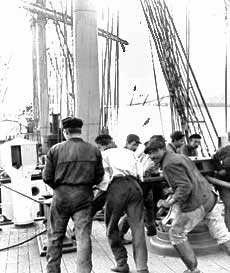New Wealth, Good for Who?
Mike Blackburn
Working the Waters
Essay3 Harmon
Alexandra Harmon describes in detail on page nine of the introduction her reasoning for using the term “Indian” when referring to any of the native inhabitants of the North West. I will use the term the same way she does.
The Indians of the Pacific Northwest had quite a developed and evolving culture. The language barrier didn’t keep different tribes from trading and interacting with each other. The geographic proximity of the tribes in this region made interaction, be it positive or negative, almost unavoidable. Trade came naturally, because wealth and power were prominent features in their social system and there were more than enough resources to go around. These characteristics are what enabled The Hudson Bay Company to trade with them. The tribes had a propensity to trade. When a new form of wealth entered the region with the arrival of the HBC, the Indians culture was already in place to welcome and trade with them. The process of adapting their culture to the new comers was in the end what enabled them to be taken advantage of.
The Puget Sound Region as we know it today is strikingly similar to the region as it was described in the text in the 19th century. The tribes primarily though not exclusively traded within this region. Fort Langley on the Fraser River was the furthest removed and the exception according to my notion of the Puget Sound Region.
Was capitalism already alive in the North West when the HBC set up shop? To some degree it seems that it was. Capitalism is the pursuit of profit thus wealth. Traditionally the western cultures that developed this economic system acquired profit by taking advantage of the work force. In the case of trading, whoever is procuring the goods (workforce) is in the end being profited off of by receiving less than the inherent value of those goods. The inherent value was different to each culture and mutually beneficial. The Indians however, came by profit in a variety of ways be it advantageous marriage, raiding/murder, or by the traditional successful trading.
The HBC didn’t necessarily take advantage of the Indians. Harmon states (P?) that the trading was mutually beneficial. For example metals were very valuable to the Indians while the employees of The HBC valued food more. They were new to the land and did not know techniques for fishing or farming in the area. In the end Western Culture dominated the Indians Culture because of the lower inherent value of what they traded. Colonial economics (capitalism) was setting the standard for value across the globe. Today, our notion of wealth seems to be absent from Indian Reservations, or at least less prominent than in our cities, so it is easy for us to say that we took advantage of them. However, any community that participated in trade without having a capitalist economy in the first place was taken advantage of. When western society commingled enough with the Indian’s society that our economic system was one and the same thus each cultures idea of wealth was one and the same, the Indians were left with a few metal trinkets and we had all the furs.
This draft is still evolving a lot. The argument is controversial to me. I am open to all comments/critique. I am really going to expand on the italicized paragraph. I also haven’t written a conclusion yet…

